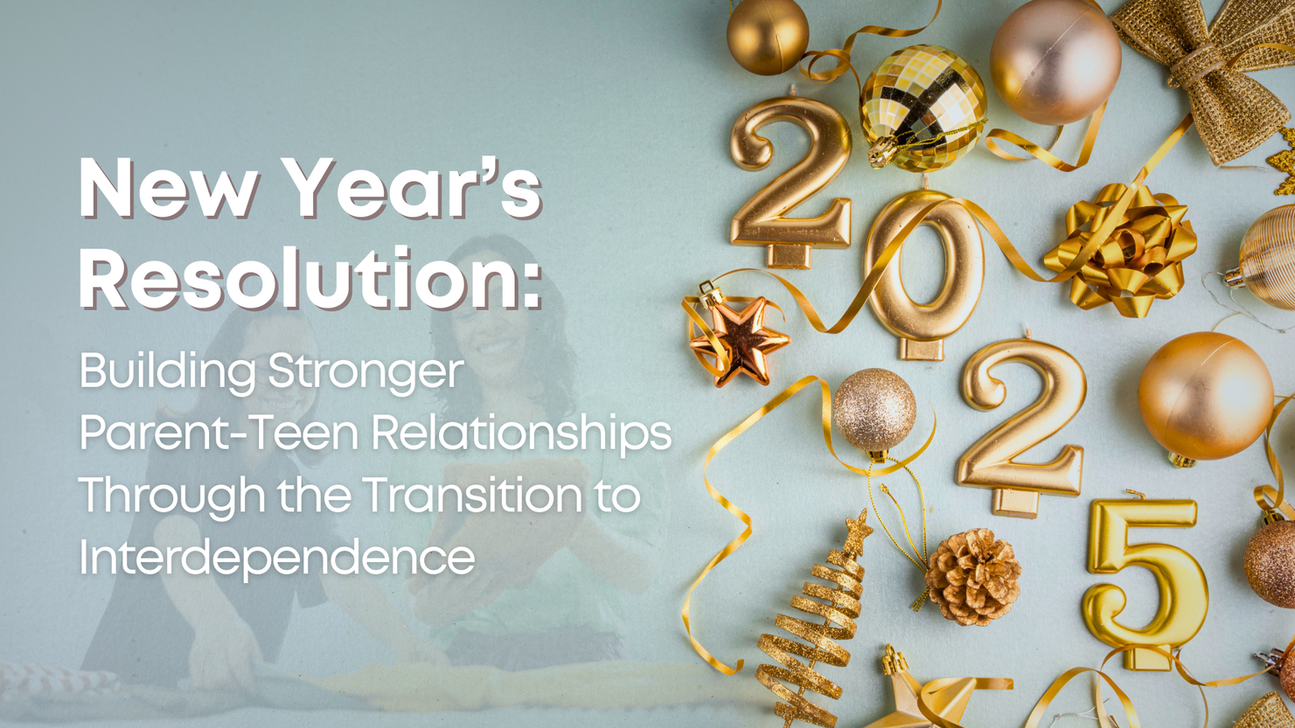New Year’s Goals for a Stronger Parent Teen Relationship

As we step into a new year, many of us reflect on our resolutions, goals, and areas where we can grow. For parents of teens transitioning out of the home, this time of year can feel especially significant. It’s a moment to not only think about personal goals but also how we can support our teens through their journey of independence. One of the most important resolutions you can make is focused on strengthening the relationship with your teen, especially as they move towards adulthood.
The Challenge of Letting Go
The transition from high school to adulthood is a big one—both for your teen and for you. As they prepare to step out into the world, it’s natural for parents to experience mixed emotions. You may feel proud of their growth, yet anxious about their ability to navigate challenges independently.
A common struggle parents face is knowing when to step in and when to let go. Offering guidance is important, but so is giving your teen the autonomy they need to grow and learn. This balance can be challenging, but it’s one of the key elements in fostering a healthy, supportive relationship as your teen steps into adulthood.
Building a New Relationship Dynamic
This year, as part of your New Year’s resolution, focus on shifting the relationship dynamic with your teen.
Here are some strategies to help you strike that balance:
Active Listening:
Make it a resolution to truly listen to your teen. Instead of offering solutions immediately, listen to their challenges and validate their feelings. Teens need to feel heard, and it shows them that you respect their independence. This practice fosters trust and openness in your relationship.
Encourage Independence:
Offer support in ways that allow your teen to make their own decisions. Instead of taking over tasks or solving problems for them, encourage them to take responsibility and ownership. This builds their confidence and prepares them for life after high school.
Set Boundaries with Empathy:
Your teen may seek more freedom, and you may struggle with the loss of control. However, it’s important to set boundaries that are both firm and flexible. Have open conversations about expectations and respect each other’s space. This will allow both of you to maintain a sense of connection while giving them room to grow.
Positive Reinforcement:
Celebrate their wins—no matter how small—and acknowledge their efforts. Reinforcement of positive behaviors strengthens the parent-child bond and builds self-esteem.
Respect Their Need for Space:
As your teen becomes more independent, they may want to spend more time with friends, focus on their academics, or even retreat into their own world. Respecting this space is key to nurturing their independence without feeling neglected.
Create Rituals That Reinforce Your Connection:
Even as your teen becomes more independent, keeping certain rituals can strengthen your relationship. Whether it’s a weekly phone call, a monthly visit, or even a regular check-in over text, maintaining small but meaningful touchpoints will allow your bond to flourish.
Why New Year’s Resolutions Matter in This Transition
New Year’s resolutions are an opportunity for parents to set intentions for growth—both for themselves and for their relationship with their teen. By focusing on building a stronger relationship with your teen, you create a solid foundation for both of you to navigate the upcoming changes.
It’s easy to get caught up in the challenges of letting go, but with the right mindset and consistent effort, you can create a space where both you and your teen thrive. This year, your resolution might not just be about personal achievements but about fostering growth and independence in a way that empowers both of you.
Take Action: Start the Year with Connection
As you embark on this new year, I encourage you to make relationship-building a central focus. Try implementing one or two of the strategies mentioned above, and commit to checking in with your teen regularly about their needs and your own. It may take time, but through patience, empathy, and understanding, you can create a relationship dynamic that honors both their need for space and your desire to support them.
Take the Next Step:
If you’re looking for more guidance on how to navigate this transition and develop a healthy, supportive relationship with your teen, I invite you to explore more resources on my website, Lloyd Learning Labs.
